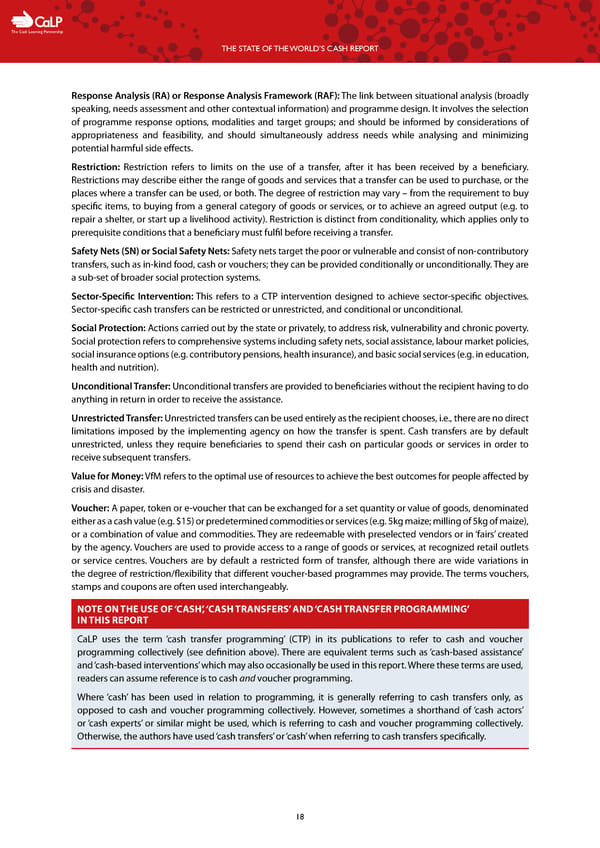C The Cash Learning Partnership THE STATE OF THE WORLD’S CASH REPORT Response Analysis (RA) or Response Analysis Framework (RAF): The link between situational analysis (broadly speaking, needs assessment and other contextual information) and programme design. It involves the selection of programme response options, modalities and target groups; and should be informed by considerations of appropriateness and feasibility, and should simultaneously address needs while analysing and minimizing potential harmful side effects. Restriction: Restriction refers to limits on the use of a transfer, after it has been received by a beneficiary. Restrictions may describe either the range of goods and services that a transfer can be used to purchase, or the places where a transfer can be used, or both. The degree of restriction may vary – from the requirement to buy specific items, to buying from a general category of goods or services, or to achieve an agreed output (e.g. to repair a shelter, or start up a livelihood activity). Restriction is distinct from conditionality, which applies only to prerequisite conditions that a beneficiary must fulfil before receiving a transfer. Safety Nets (SN) or Social Safety Nets: Safety nets target the poor or vulnerable and consist of non-contributory transfers, such as in-kind food, cash or vouchers; they can be provided conditionally or unconditionally. They are a sub-set of broader social protection systems. Sector-Specific Intervention: This refers to a CTP intervention designed to achieve sector-specific objectives. Sector-specific cash transfers can be restricted or unrestricted, and conditional or unconditional. Social Protection: Actions carried out by the state or privately, to address risk, vulnerability and chronic poverty. Social protection refers to comprehensive systems including safety nets, social assistance, labour market policies, social insurance options (e.g. contributory pensions, health insurance), and basic social services (e.g. in education, health and nutrition). Unconditional Transfer: Unconditional transfers are provided to beneficiaries without the recipient having to do anything in return in order to receive the assistance. Unrestricted Transfer: Unrestricted transfers can be used entirely as the recipient chooses, i.e., there are no direct limitations imposed by the implementing agency on how the transfer is spent. Cash transfers are by default unrestricted, unless they require beneficiaries to spend their cash on particular goods or services in order to receive subsequent transfers. Value for Money: VfM refers to the optimal use of resources to achieve the best outcomes for people affected by crisis and disaster. Voucher: A paper, token or e-voucher that can be exchanged for a set quantity or value of goods, denominated either as a cash value (e.g. $15) or predetermined commodities or services (e.g. 5kg maize; milling of 5kg of maize), or a combination of value and commodities. They are redeemable with preselected vendors or in ‘fairs’ created by the agency. Vouchers are used to provide access to a range of goods or services, at recognized retail outlets or service centres. Vouchers are by default a restricted form of transfer, although there are wide variations in the degree of restriction/flexibility that different voucher-based programmes may provide. The terms vouchers, stamps and coupons are often used interchangeably. NOTE ON THE USE OF ‘CASH’, ‘CASH TRANSFERS’ AND ‘CASH TRANSFER PROGRAMMING’ IN THIS REPORT CaLP uses the term ‘cash transfer programming’ (CTP) in its publications to refer to cash and voucher programming collectively (see definition above). There are equivalent terms such as ‘cash-based assistance’ and ‘cash-based interventions’ which may also occasionally be used in this report. Where these terms are used, readers can assume reference is to cash and voucher programming. Where ‘cash’ has been used in relation to programming, it is generally referring to cash transfers only, as opposed to cash and voucher programming collectively. However, sometimes a shorthand of ‘cash actors’ or ‘cash experts’ or similar might be used, which is referring to cash and voucher programming collectively. Otherwise, the authors have used ‘cash transfers’ or ‘cash’ when referring to cash transfers specifically. 18
 The State of the World's Cash | Full Report Page 19 Page 21
The State of the World's Cash | Full Report Page 19 Page 21